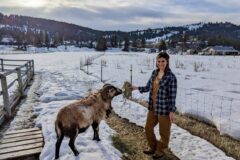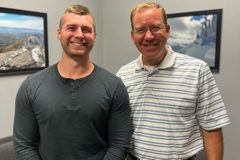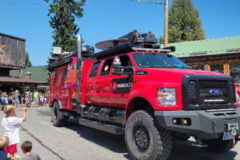Welcome to another episode of Making it Work in Montana! Below is my interview with Anders Broste. Anders is the Chief Technical Officer at Esker Cycles, a Columbia Falls, MT bicycle company. He’s a father, husband, and he enjoys the Montana Outdoors with hunting, backcountry skiing, mountain biking, fly fishing, rafting…. Anders is an expert on Making it Work in Montana!
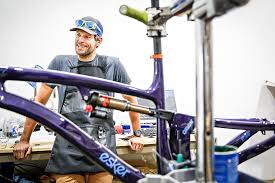
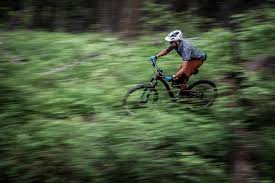 photo credits: Hunter D’Antuono, Singletrack.com
photo credits: Hunter D’Antuono, Singletrack.com
check out these articles about Esker Cycles:
https://theradavist.com/2018/08/esker-cycles-new-150mm-travel-27-5-elkat-mountain-bike/
And check out these images from Anders’ rescue and after:
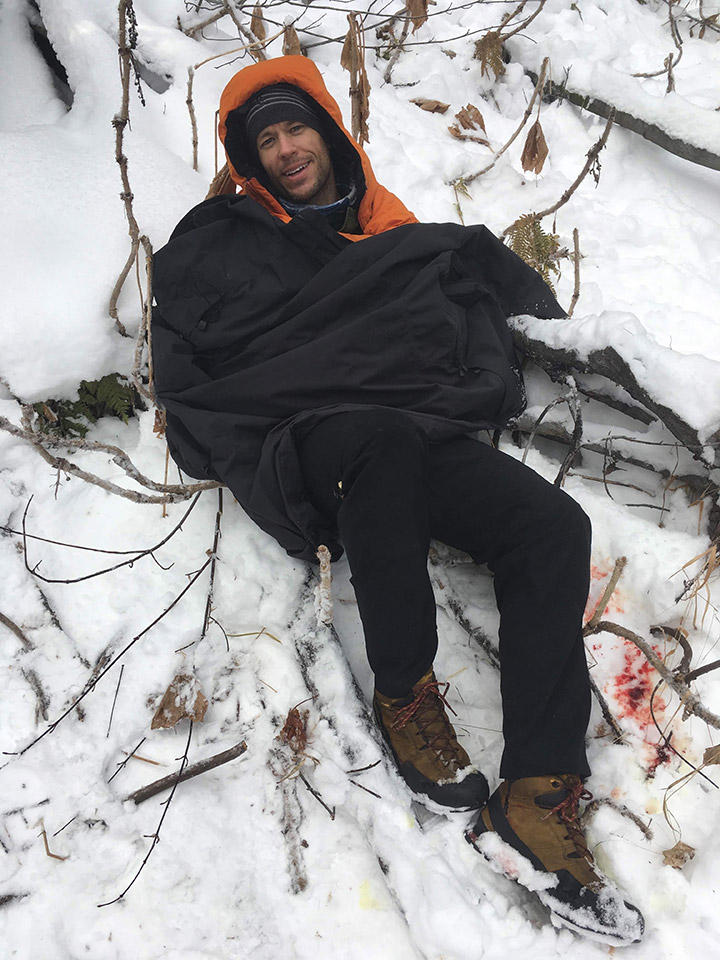
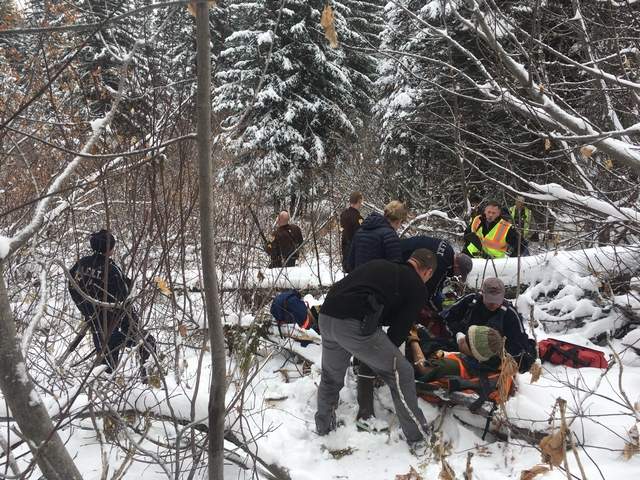
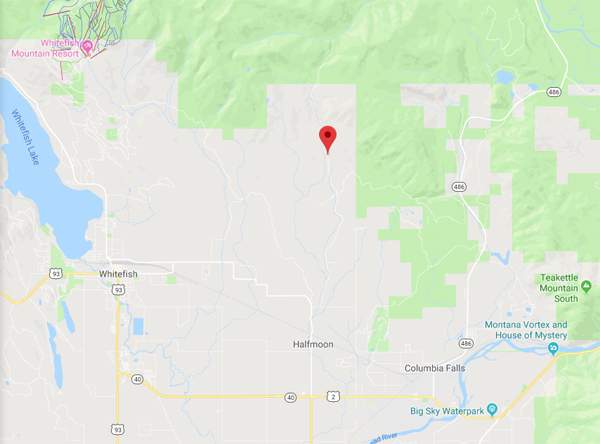
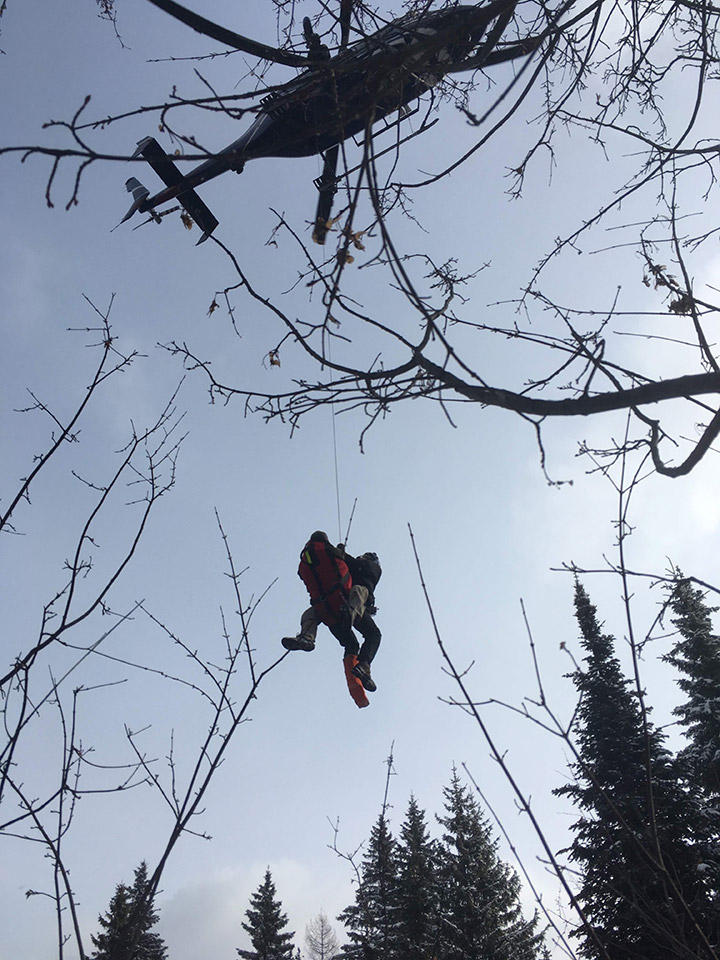
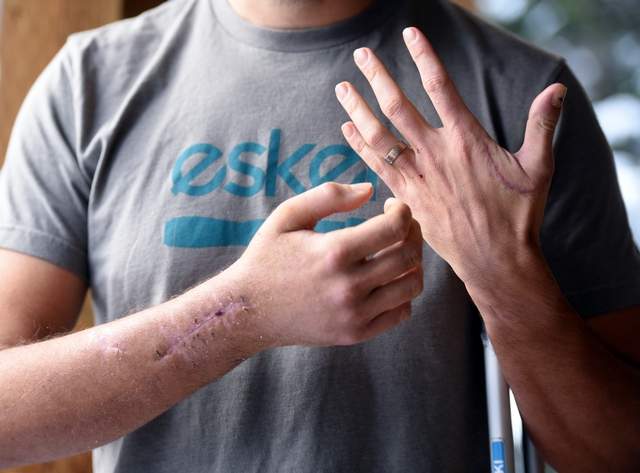
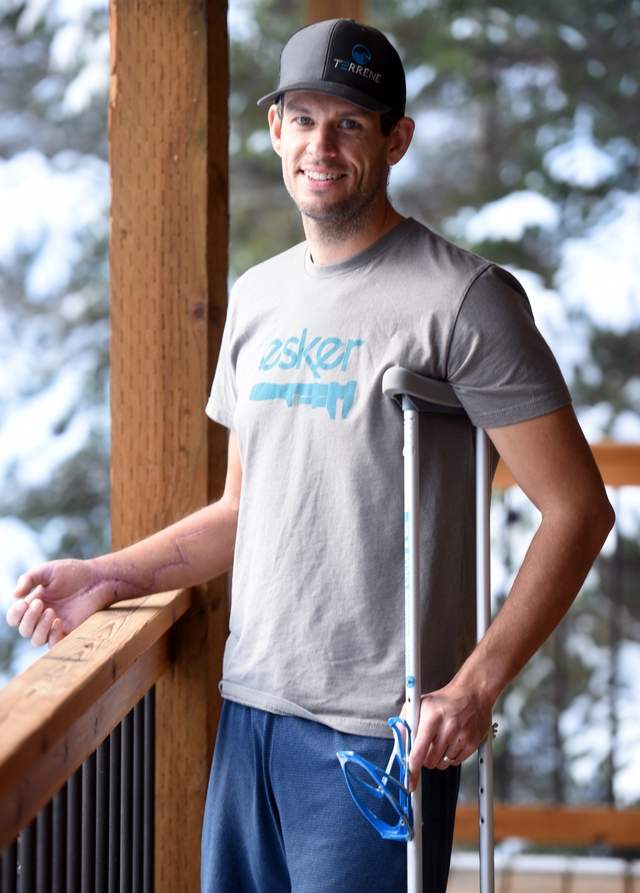
photo credits: Anders Broste, Brenda Ahearn (Daily InterLake), Anders Broste, Brenda Ahearn (Daily InterLake) bottom two.
Follow Anders on Instagram here ![]() or on Facebook
or on Facebook ![]() and Linked In here
and Linked In here ![]()
********************************************************************************************************************************************************************************************************************************************
Transcribed here:
On this episode of Making It Work in Montana, I am really excited to feature somebody who’s got an interesting story and is making a living for themself in Montana. Our
guest is currently the chief technical officer at Esker cycles and he’s a father and a husband. You’ll run into him in mountain biking, outdoors and the skiing. He’s a hunter. He really enjoys living in Montana. One local organization he’s involved with is the Flathead Area Mountain Bikers, who a lot of different people are involved with that
organization, which helps make awesome mountain biking available here in Flathead County. And he’s got an amazing survival story, which we’ll be talking about today.
But our guest today is Anders Broste.
[00:00:58]
Oh, go on. Thanks for coming on to make it work in Montana. Oh, my pleasure.
[00:01:03]
So that was a brief introduction. Was that fairly accurate?
[00:01:07]
Yeah, that sounds about right.
[00:01:10]
Anders, if you could just for people who don’t know you very well personally.
[00:01:15]
Could you just give us a walk through of, you know, where were you born and how did you end up in your current position where you’re working for the bicycle company
in Columbia Falls, Montana, that sells bikes all over the world?
[00:01:30]
I assume. I’m working on getting them sold all over the world.
[00:01:33]
But yes, mostly just shipping logistics. OK. So I was born in Colorado. I’ve lived there for about eight years.
[00:01:42]
And then my dad’s job took us out to the D.C. metropolitan area. So really grew up in northern Virginia. Always with passion to get back to Colorado. I was at least old
enough to know that I wanted to be in the mountains. What town? In Colorado? Colorado Springs. OK. So, I mean, leaving at 8, you know, some might say it’s not you
know, it’s not quite imprinted, but it was for me. I mean, the mountains have been special to me for a long time.
[00:02:13]
So, yeah, I grew up in northern Virginia, ended up going to school in Minneapolis, Minnesota.
[00:02:19] My mom grew up there. So there was a little family connection there and then got a job out at SemiTool in Kalispell in 2007. Just posting on the job board in the student
lounge might have been the worst cover letter I’ve ever written in my life. But glad it worked out because I’m not sure I would’ve gone out here otherwise. But yeah, I moved out here in 2007. I worked for SemiTool and applied materials through the transition. Left, spent a year in South Korea, came back here for a couple years, and
then I actually left Applied Materials go work at quality bicycle parts in Minneapolis. About two years into that, I decided that I needed to get back to Montana.
[00:03:09]
Spent all my time and time and money trying to just get back out west. And so just kind of put in my two week notice, sold everything I had pretty much and move back with no real plan. And I was fortunate enough that my old boss was looking for somebody.
[00:03:24]
So I got back into that, but always maintained connections with friends back in Minneapolis in the bike industry. And when another friend left, he contacted me to do
some design work for a tire company that he started called Terrene Tires. And then Esker cycles kind of evolved from another brand that he started. But we’re still doing
Terrene and Esker were just over a year old and growing and making improvements slowly but surely. And it’s been a wild ride. But that’s how I ended up in Montana.
[00:04:00]
And some of the things that you’re involved with, you know, as far as enjoying Montana, I was just thinking of the things that I’ve interacted with you. But, you know, I’ve
seen, you backcountry skiing. I actually bought a pair of used skis off you once. And I had one fond memory I had was I had like a I went to go buy them and you went
ahead and mounted them for me in your garage because you had all the stuff in there, which I thought was pretty cool.
[00:04:28]
Yeah, pretty cool garage with lots of gear and stuff. So I must be part of a connection into your affinity with working for bike companies like to tinker with things or. Oh for
sure.
[00:04:38]
I’ve , even at Applied. I really kind of found myself in more of a product development and product troubleshooting standpoint. I love working with my hands. I love
problem solving. Never had a problem, you know, diving in and getting dirty on things. But yeah, you know, and in the outdoors just kind of was an evolution of some of
that in the sense that the. the gear, you know, you have to maintain your gear and it’s changing. And when I when I decided on my college major, at first I was going for
civil engineering because everyone’s like, you’ll be outside. I did not think I was actually going to be outside. And learning details about roads sounded pretty boring. So I
actually went into material science, just kind of looking at how things were evolving in the outdoor gear industry. You know, not just bikes, but other aspects. And a lot of
the big a lot of the big changes that I was seeing were made to material base. And I would say that’s still true today.
[00:05:37]
So, yeah, I’ve always been a gear nut. I was actually one of my first personalized plates and Virginia was gear nut. I got it hanging in my gear shed.
[00:05:46]
I love going in my gear shed and waxen skis and fixing bikes and pretty much anything I can take apart and put back together. I’ll give it a go at.
[00:05:55] Well, that’s a good skill. I know when I’m out or I’m out and about, I’m having a problem with gear.
[00:06:00]
I’m hoping there’s a gear nut nearby because I’m just staring and I know my gear is not working. I’ve fixed a few bikes in the backcountry.
[00:06:09]
Some people, owe me a few cables and tubes in her other bits and pieces.
[00:06:13]
But part of making it work in Montana is knowing how to make your gear work.
[00:06:18]
You’ve got to be able to get get yourself out of some of these far out places. Absolutely. So.
[00:06:23]
So there’s a biking and backcountry skiing. Are there any other things you like to do in northwest Montana and the outdoors?
[00:06:31] Rafting, kayaking, fishing, fishing is kind of my golf in the sense that I don’t know. It’s relaxing. I don’t know. Like fly fishing. Fly fishing. I don’t do it as much as I should. I
got into hunting when I moved here. It wasn’t something that I grew up with. But when you’re at work and everybody’s suddenly gone in mid-October through November,
you’re kind of like where everybody go. It’s horrible outside. And then people would invite you along and it just kind of grew from there. But I mean, really, anything
outdoors? I mean, there’s there’s so many things to do around here. It’s it’s hard. It’s really hard to do alone. I mean, we my wife and I always comment that we never
spend enough time in Glacier. And it’s just because we’re so busy doing other things.
[00:07:13]
I agree. As I finally am old enough to be able to get the gear I need to be in the outdoors, you know, then it’s just find the time to get out there and use everything.
[00:07:23]
And then. So I want to hear a little bit more about Esker cycles, because just when I was introducing it, I realized that I don’t quite understand it.
[00:07:32]
As long as you tell me, like, what exactly do you guys do?
[00:07:35]
And you have a business that’s located right in Columbia Falls. So how does it work? And the whole bike community.
[00:07:42]
So Esker Cycles was a it’s a project that about four of us started. Myself, My good friend Tim, his brother, and then another mutual friend, Jason, just bike enthusiasts. Tim
and I worked at qBP together. So there was that connection there. You know, he saw me in particular because I was in Montana and said, hey, you know, if we’re going to
start. He wanted to start a mountain bike company. He had had some connections with Dave Wiegel, who’s kind of a suspension mount bike suspension guru. You could
say. And so he approached Dave about bringing to market one of his patents. And so it kind of just evolved from. We were gonna do low end bikes or not low end bikes,
but high end suspension at an affordable price point. And then Dave asked if we were interested in bringing one of his final patents to the market. So we’ve been we’ve
been working on it for about four years. The whole time I was working at Applied Materials. So I was always kind of just in the evenings and on the weekends putting in the
extra time. But yeah, he he sought me for my engineering skills, but also because I was in the mountains in Montana and one of the things he took away from his previous
job was it’s really hard to sell mountain bikes from a brand base that in the Midwest, not saying that it can’t be done, but that was, you know.
[00:09:10]
And so me being in Montana was going to help secure that and get us here. And I definitely drove it and push it and made sure it stayed here, because it’s something
that I always kind of wanted and something that always just kind of sat with me from a jobs standpoint, too, was when I moved here, you know, at least back in 2007,
there weren’t a lot of engineering opportunities in the valley. You know, there civil engineering and there were some of the other smaller companies. But semi tool and
Applied Materials or what became applied to your Applied Materials were really your only options. And so, you know, everybody always said, like, you either work here or
you figure it out on your own. And so I guess they figure it out on your own. Always kind of stuck in my head. Just gonna wanted to make sure that, you know, I wasn’t
forced to leave here. I think was the biggest thing. And that’s also what just drove me. from working in the bike industry in Minnesota, it’s like this place just gets its hooks
in, doesn’t let you go and you don’t want to let it go, so you do what you gotta do to make it work.
[00:10:13]
So. So you guys are selling parts of bikes or complete bikes and are you working with other buy companies or how does that work?
[00:10:21]
So we we specialize in bringing complete bikes to the market. We specifically do the engineering and design work on the frames. So Dave is we license his suspension
platform. So we work with him.
[00:10:37] He basically tells us where to put the pivots on the bike and helps us with the shock tools and that. But we define the actual geometry of the bike. And then myself and
Jason, who’s our industrial designer, we do. We do the 3D design work on it. And then frames are manufactured in Taiwan because that’s where the infrastructure is, where it although that’s changing. Some of that is coming back to the US very slowly. I think it’s something we’d really like to be able to do some day. But from a barrier
to entry standpoint, you know, we don’t have the resources or the the manufacturing facility in the US to make that happen. And so frames are made in Taiwan. They’re
shipped over here. And then we assemble all the frames, actually. I wear a lot of hats. I’m not just some fancy titles, chief technology officer. I manage the warehouse, do
inventory, build and fulfill orders, build bikes, not discounting of My other co-workers, they all play an important role. Our marketing guys in Bozeman and then a couple of
the other guys are spread out throughout the country. So we’re pretty diversified in terms of where we are. But so we bring the frames in and then we we assemble them
and then ship them out to dealers and directly to consumers.
[00:11:59]
So so you make work in Montana by coming to one of the corporate companies that hires engineers and then you able to kind of branch out on something really specific
to what interests you. Yeah, that’s about right.
[00:12:12] We had a lot of people that’s they’re coming to Montana and they’re either they’re trying to figure out like a, you know, I want to be here, but how I make a living here.
[00:12:20]
So that model worked really well for you. Is the company having the warehouse in Columbia Falls? Has that been? Is that a totally worked with. Sounds like you guys are
getting all the pieces together where it works to be located in Columbia Falls for running the business. And it’s not like you guys wish you were located in other parts of
the country.
[00:12:41] No, I think it works out pretty good.
[00:12:43]
Shipping takes a little bit longer. But I think with communications, you know, we we have bi weekly calls where, you know, we have people outside of Portland, people in Minneapolis myself here. Our marketing guy in Bozeman. So we’ve really establish the business model to be, you know, be capable of functioning no matter where we are.
And it has its challenges. But I think, you know, would this have been possible 20 years ago? Probably. I mean, it would have been just really hard. You know, it’s really
easy to get six people on the phone right now. Oh, and Duluth, too. We actually just hired someone to help operate Terrene Tires, Duluth. So we’re really spread out all
over the place. So, you know, I think time timing. And then just the flexibility of everybody in the group makes it work.
[00:13:38]
It’s not perfect. And we’re constantly ironing out the wrinkles. But, you know, I think everybody kind of gets to create the job that they that allows them to live a life that
they want to live.
[00:13:51]
That’s great. You know, I I’ve been telling people recently in the mortgage company that the number one employer right now that I deal with is people that are working
for a company that are going to live in the flathead. But the company could be anywhere. And that wasn’t the case when I got in the business. But it’s evolving to the
point where if you have a skill and you can do it, your employer doesn’t need you in an exact location to be able to add value to that company. And so it’s really opening
up doors for people that just want to live in Montana or the flathead because they want to live here.
[00:14:22]
Yeah. And I think there’s value in for us as a Mountain Bike company in being in a place like Montana in the sense that we have an incredible trail network, not only here
in northwest Montana, but across the border in British Columbia, Idaho, Washington, Oregon. You know, we’re deep in the mountains. And so from a product test
standpoint, you know, we put our bikes through the ringer.
[00:14:50]
Yeah, you can you can leave work and immediately be where the best place to be using your product is.
[00:14:55] No. Yeah. Yeah. I mean lunch rides are pretty common, right.
[00:15:00] Well that’s a great.
[00:15:02]
Background and then I wanted to get on to this other development in your life because it’s incredibly interesting. I don’t even remember how long ago it was anymore. It
seemed like it was just yesterday. But you had an encounter with a bear and everybody heard about it. And I was wondering you could just tell people about it, because
like for me personally, like I’ve had about 10 times when I’ve been out back country, enjoy myself and I’ve seen a bear, but I’ve been really fortunate.
[00:15:32]
The fact that I. That’s about as close as I’ve had to come where I’ve seen the bear. We’ve had our moment of maybe we either acknowledge each other or we didn’t. But I
didn’t have to experience a bear the way you did. So maybe tell us about the experience. Now I have a few follow up questions because not everybody’s Been able to
have the experience that you did.
[00:15:50]
Yeah, I wouldn’t wish it on anybody, although it’s it’s not a negative thing in my life.
[00:15:55]
Yeah.
[00:15:55]
So I was again, like I, you know, getting into hunting after moving here. It’s kind of been a it’s become a pretty important part of my life, not just because of the actual
activity and the food, but it’s also something that my wife and her dad, you know, it’s kind of like a father daughter bond that they’ve had since she was a young girl. So
I’ve learned a lot from them. But just out on north of the house, actually out with a friend getting him into hunting. Similar situation to me. You know, when I moved here,
I’ve never been hunting. He’d done some duck hunting in Minnesota. Good friend Dan. And he had never been big game hunting.
[00:16:39]
And so I was like, oh, yeah, lets you know he expressed interest in so great. You know, let’s get you out. You know, either go to the cabin or, you know, we’ll go poke
around north of our house. We live up north of Columbia Falls in the woods. And two weeks prior to that I had actually gotten my deer and seen a lot of sign and actual
activity. And so felt like, you know, that this is a good opportunity for, you know, for us to go somewhere that I’ve scouted out some good line of sight, which is
challenging around here. Let’s go get Dan a deer. So we we hop on the ATV cruise up from my house and it snowed the night before about six inches.
[00:17:15] We get up, park, start walking up the road, plan to do kind two areas, one that we’d push through kind of to get to another area where we’d sit on this knoll and kind of
look down into this cleared or log area. And, you know, actually walking up the road, you know, there are various signs of different critters all over the place, nothing
specific. But I kind of turned it and I was like, you know, in the 12 years that I’ve been running around the woods here, I’ve seen one wolf and two grizzly bears in two
different situations. One was crossing the North Fork and I was in a car. So that’s pretty far away. And then the other one was a mom and two cubs on the other side of
Lake over on the east side. You know, I mean, it’s hundreds and hundreds of hours of time spent, you know, hiking, biking, skiing, fishing, whatever, through the woods.
And you haven’t seen anything. So maybe I shouldn’t have said that that morning.
[00:18:12]
But we we were. You had a epiphany. Yeah, no.
[00:18:18]
So we we moved through our first area and then we kind of split up just kind of cover a little more area. Definitely seen some sign. I was following what ended up being
some moose tracks. Dan was about 150 yards away. And I’m kind of the moose had changed direction, which in hindsight would have been an interesting thought process
at the time. And so I did a 180. But I at that point was like out of here, I’m just gonna go off and, you know, I could see where I wanted to go. And I was just kind of b-lining
towards there, you know, thick brush going over downfall, snow-covered downfall. So kind of using all my hands to balance and get over. And yeah, I I got a little too close
to a sleeping grizzly bear. He’d been bedded down in the area for a couple of days as best as Fish Wildlife and Parks could tell after they’d gone and done some post
encounter searching around and it was about 15 yards away and you know, there was no warning, there was nothing. It was just grizzly bear running at me full tilt at
about enough time to swing my rifle out and mentally process the fact that I wasn’t getting my finger in the trigger guard or getting the safety off or anything else. I mean, it was just it was so fast.
[00:19:41]
So I basically poke the bear with the rifle and knock me back. Bit my arm shook me around a bit, breaking my arm, dislocated my hand, breaking my hand. And then it bit my leg, thrash me around there, breaking my fibula and tearing my foot apart. And then final bite was on the toe box where it pulled on me a bit. I’m pretty sure that’s where I tore my ACL mCL meniscus. And then dropped my foot ran off and people were like, Oh, were you fighting back? No. I was screaming for Dan.. Hold on the things
to keep it from dragging me. But yeah, they. I don’t know. We figure it’s about 15, 20, 30 second interaction. And then I just remember this brown fuzzy butt running off.
And then I kept yelling for Dan and being one hundred fifty yards away and that kind of terrain, it took him a little bit to get there. But he was there pretty quick and fired
a couple shots and then proceeded to call my wife, which was pretty funny because she was pretty concerned that he’d never been hunting. And so when she got this call
from from him and didn’t recognize the number. Her first thought she had kind of do, she was worried that he would accidentally shoot me.
[00:20:52]
And so she thought he shot me. But I still think it’s really funny. And then he’s like Andders got attacked by a bear.
[00:21:03] We tried to walk out not knowing really the extent of my injuries. Took about two steps in my my left leg, went 90 degrees out to the side, collapsed in the snow. And at
that point we called 9-1-1. We were fortunate enough to have cell phone service where they could triangulate us to get our exact location and then set in motion, you
know, various government agencies and volunteers coming in to help out. Alert got there first. They were able to land and hike in. They assessed that they couldn’t get me out. Sheriff’s department there, flathead search and rescue two bear air eventually ended up coming in, hoisting me out. So a big thanks to all those folks who helped
out with that and anybody I might have missed those. It’s pretty intense, but I can tell you, not generally a big fan of people with guns. As a hunter, I’ll say that, but I’ve
never been so excited to see more and more people with big, big guns and the situation.
[00:22:02]
It felt safer just to have a lot of people with resources. oh yeah
[00:22:06]
I mean, once, once, once people start showing up like my, you know, the concerns. And so I don’t know. I don’t know I don’t know if it’s fears, but, you know, you’re you’re
in the woods and you’re in the thick brush. And it’s just you and a buddy. And, you know, you’re really incapable of doing much of anything, let alone, you know, defending
yourself. And so having having the Calvary show up for a lack of better terms was pretty good feeling. I’m sure Dan is just as excited to have people also show up right
now.
[00:22:35]
So because they got they know exactly what they’re doing and you guys can kind of back off the gas a little bit now, you know, just don’t have to be in survival mode quite
as much.
[00:22:44]
And actually, my wife showed up, too. She, of course, knows all these people. She’s an ER nurse. And it was actually pretty cool. You know, she came over, made sure I was OK. And then like, she just flipped the switch and went into nurse mode and just started helping. So it’s pretty cool to see, you know, it’s not not I get to hear some
stories, but it is just pretty cool to see her do her thing and keep it together, given the situation.
[00:23:09]
Sure. She’s pretty strong lady. So it might have helped her to be in work mode around him and to think about what was really going on, too.
[00:23:16]
Yeah, I think so for sure. So, yeah, that was that was September or November 11th of 2018. So. So.
[00:23:23]
So two years ago and a few months you’re in a few months you’re a few months, OK?
[00:23:28]
Even closer. So one day you imagine that is interesting because I think a lot of people don’t realize this until they’ve been in the situation you’ve been in. But the way you
describe the bear encounter is what we all don’t really think about as it’s so fast that, you know, you had one chance to, like, get your gun and maybe try to poke him with
it. But then you are just ragdoll, right? Like, oh, just you didn’t know what was going to happen at that point.
[00:23:54]
And so a lot of times we’re out there hiking and we think this is what I’m gonna do if I see a bear. But a better approach is probably to just be prepared to avoid the
situation altogether because it’s really fast.
[00:24:08]
Yeah. I don’t know. I think I think there are things you can definitely do to lessen the chance of it. I mean, I think it’s such a small chance anyways, you know, and for the
record, I just want to say that since I moved to Montana, I knew this was bear country. So it’s you know, that’s to me was no, obviously, it was a surprise, but it just it is what it is. But, you know, from a from a what do you do situation? You know, every situation is going to be different. My feeling is is like there are times where, you know, whether it’s a rifle, whether it’s a gun or a bear spray. Although, you know, right now my philosophy is bear spray, pistol maybe pull out the pocket knife in the order of what’s called the bear spray is the creepiest one to pull off.
[00:24:56]
And it has a wide range of spray.
[00:24:59]
You don’t need to be proficient. I’ve shot my pistol.
[00:25:02]
1 I am not good at it.
[00:25:06]
I sent her on the podcast note. I listened to a blog. I’ve been listening to a hunting podcast called Meat Eater. I think it’s phenomenal for lots of reasons, not just on day
like. Just super interesting people, but they talked about, you know, pistol defense on grizzly bears and whether it’s proficient or in useful or not. And some outfitter did
this test with its guides or they rolled basketballs down a hill and like you had to spit around and try to shoot a bouncing basketball before it went past you and nobody
could do it.
[00:25:39]
So and that’s kind of like a bear running at you because, you know, I mean, it’s it’s it’s heads bobbing. It’s moving over terrain anyways.
[00:25:48]
Sure. Chirp, bear spray, pistol, knock on some wood. But but I think I think to me the bigger thing is you can’t predict or prevent anything. You’re better off preparing
yourself to deal with a bad situation. You know, Dan and I were super fortunate in that we had we had cell phone service and they were able to triangulate our location. If we had been a half a mile around the ridge, we would have been on our own. Would we could we have figured it out? Did I have life threatening injuries at the time? No. I was very fortunate.
[00:26:21] Did you have bandages? No. So when you were trying to get out were you bleeding? we checked everything.
[00:26:28]
It was pretty minimal bleeding like nothing that was squirting or anything like that. I mean, it was you know, when I said this with lots of friends, too, there was a large
amount of backyard complacency. You know, you live in a place and you get comfortable with the place. And, you know, the plan that morning was, oh, we’re gonna go
out hung for a couple hours or and come back. And then I’m going to go skin up the hill and go skiing with my wife. And, you know, it was just supposed to be a short morning adventure. So like the pack was pretty minimally packed.
[00:26:58]
I mean, I had when I needed to I had extra coffee, probably didn’t need that, although it was good at one point, you know, and what I needed to get a deer out, dress it
and take care of it like and a puffy coat. But there wasn’t a whole lot. I mean, if you look at my pack now, I got a first aid kit in there with a tourniquet. You know, I think
communications, I’m all about dumping technological thing. Phones, all of that stuff and getting out into nature. But I think there are things like Garmin and reaches or
spot devices that for a couple hundred bucks, you know, in that time when you’re in the middle of nowhere and you want help again, there’s nothing better than seeing
the calvary come in. It’s not like it’s something you have to have on all the time. So I think just being prepared to handle a bad situation is almost more beneficial than
trying to prevent one. You know, the chances of a bad situation happening are pretty slim. But once it happens, what do you do next?
[00:28:04]
And then lastly, or just. I’ve noticed that you’ve a really, I guess, for somebody who’s been an encounter with wildlife.
[00:28:14]
Your attitude about our relationship with wildlife is pretty impressive.
[00:28:19]
So maybe if you could just explain, like how you see the human wildlife interface, because, you know, we’re all we live here in Montana.
[00:28:28]
And whether we realize it or not, there are animals that are able to kill us just kind of roaming around or not very nearby and not at the top of the food chain.
[00:28:39]
And so after all this has happened, you know, I’ve seen like I’ve seen a social media picture of you out with a bear, like, you know, doing various things and just
communicating that. So maybe just share real quick, like what your opinion is and you know what what you think about it, because there’s a lot of pressures about what we ought to do about the human animal interface.
[00:29:03]
And since you have a little bit of a platform because of your experience, want to share your opinion on that? Yeah, sure.
[00:29:11]
I think we live in Bear Country and it was bear country before humans ever showed up here. My feeling is, is we need to take responsibility for our choices. I chose to go
on the woods knowing that there were bears out there, that there are other critters out there. You know, I think that can be said about most things that people do. You
know, we make choices to do these things. I think most critters out there aren’t hellbent on killing us, contrary to what I think a lot of people like to say. You know, they’re
just out there trying to survive. They don’t have particular motives. You know, why did the bear cross the road? The road was just and was just in its path. There was no
thought process there. Yeah, I think I think people just need to take responsibility. I think, you know, our government agency. That are studying these animals. You know,
they’re doing the best they can with the limited resources they have to understand the needs of these animals for survival. And I think once, you know, I think they
determine that, you know, there needs to be a change like they did with wolves and they need to open it up to hunting. They will. And I think that’s completely
reasonable. I personally have no desire to go hunting for bears. I can tell you for a fact that I don’t ever want to potentially injure a bear and have to be mad at me for.
[00:30:34] Right. It’s not something that into any more or ever was.
[00:30:39]
Are you still hunting deer? Oh, yeah.
[00:30:41]
I love hunting. I mean, to me, it’s it’s it’s a way of entering. It’s just another thing to be outside. And it’s it’s much more intimate than any other outdoor activity I’ve done.
And a lot of that’s just because you’re listening and looking so much more intently that you see so much more. I mean, I remember the first time hunting I was in an area
that I’d written my bike in 100 times and I’d never seen this boulder the size of a small school bus. I mean, just, you know, tunnel vision, focusing on the trail versus
hunting around. But, you know, I think if you look around Montana, the grizzly bear is a is a symbol of what makes this state wild. And I don’t think there’s a person here who would want to change that. And I think we need to learn to live with them. And that means taking responsibility for what we do, whether that’s entering the
backcountry or doing the right thing and securing your garbage and putting up electric fences around, you know, your livestock or your pets. We have the capability to make those choices to protect not only ourselves, but these animals. And I think we just need to do it. I don’t think it’s asking a lot of people to take five seconds to put
your garbage in the right place or, you know, hook up an electric fence around your chickens.
[00:32:00]
Protect the animal so that the interaction can be minimized more, which just makes it safer for both us and the animal.
[00:32:08]
Yeah, that’s kind of what I hear you saying. I think that sums it up.
[00:32:12] Well, last thing and this is kind of an odd question, but I was just Googling looking you up on the Internet and I saw that you at one time were interested in completing the
ride divide. Oh, yeah. Is that something you ever did or you stole? Is it still on her bucket list? It’s definitely still on the bucket list.
[00:32:31]
I mean, I love mount biking and I love the West. And the idea of riding my bike across my favorite part of the country is is definitely still there. And I think, you know, right
now, being busy with the company and growing it to, you know, something that will be stable and provide jobs in the future is kind of a number one priority. But my wife’s
fully encouraging. You know, we had talked about me doing it, you know, kind of as a sort of comeback. And the less, you know, after the after the accident with the bear
and yet it’s still there. It’s just, you know, finding time. And now we have a kid. How long is it going to take you?
[00:33:07]
Oh, I’m not I’m not looking to race or rush to do it. I like I like looking around and taking in the scene 20 days, maybe even longer. Yeah. OK. I think the yeah, I think like
records like 13 hours. the records are ridiculous.
[00:33:25]
It’s like three hours of sleep. Right. Two hundred miles a day. No I like I like my sleep.
[00:33:31]
You know, I’ve thought about it and I pack a tent because I don’t want to be bitten by bugs. Tents are so light now. yeah I want to enjoy it like that. To me that’s what it’s
about. It’s just riding my bike through the woods.
[00:33:43]
And if you don’t know what that is, there’s a bike ride from Banff to the Mexican border that follows a designated route called the Ride Divide.
[00:33:50]
Great thing in and of itself. Could make a whole podcast, no problem, but something I would interested in too. And my equal problem is that I don’t have a month to do it
yet, but hopefully when I finally get a month, I’m not too old to complete the mission.
[00:34:06]
But well, as far as making a work goes in Montana, I’m really glad that that you came on, Anders, because one part of making it work in Montana that I hadn’t addressed
our previous guest is the kind of interaction with the wildlife. And you’ve got a great message, just what you shared here, a little bit of it on, you know, how we can
coexist. And then I appreciate here. Now you’re you’re you’re succeeding as a father and a business guy here. So thanks for coming on the show. Oh, my pleasure, Dave.


